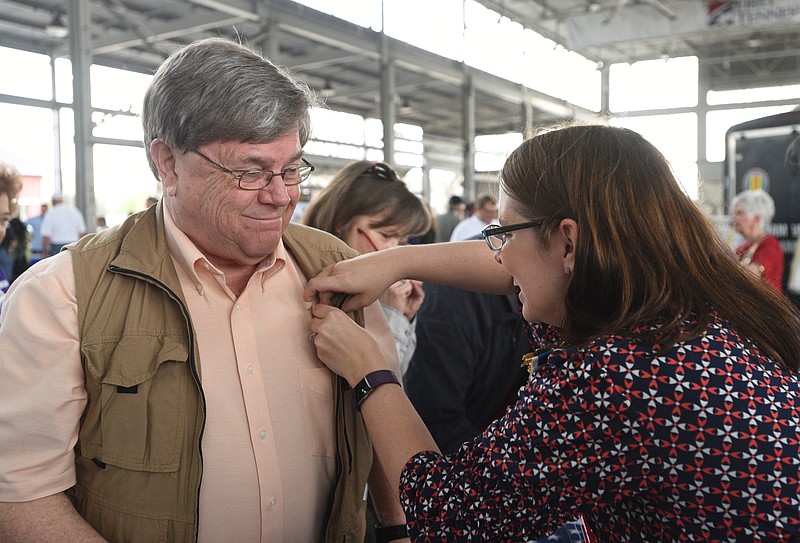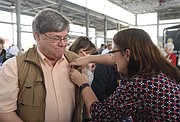It was neither the 50th anniversary of the start nor the end of the Vietnam War, but the sight of 1,000 people at Monday's 50th Anniversary Vietnam War Commemoration at the First Tennessee Pavilion was something the former service personnel who attended might never have believed they would see.
After all, when many of them returned from service in the Southeast Asian country, they were spat upon, jeered or largely ignored. It was a war whose winning at the time seemed necessary to stop the spread of communism across the region, but to many seemed pointless. It was not our region, not our duty, not worth tens of thousands of deaths and billions of dollars that might be spent elsewhere.

When it ended, the presidents who conducted it, the men and women who fought it, and its cause all were highly unpopular.
Indeed, it was not deemed the "just" war the parents of its military personnel had fought. The United States had not been attacked on its homeland, as was the then-territory of Hawaii on Dec. 7, 1941. And the leaders of the sliver of a country that is today Vietnam were not conceived to be the same kind of menace as Adolf Hitler had been 25 years earlier.
Our country, unlike during World War II, never went on a war footing. No rationing was called for; no women were called to serve in jobs vacated by their husbands. There was no sense of a country pulling together for a valiant and common cause.
And yet, many United States men and women, whether in volunteering their service or having been drafted, served the same as their fathers did a generation earlier. Some were brave, some were scared; most simply did their duty. They attempted to accomplish the mission, to achieve the objective.
Back home, afterward, the men and women who served were tied to the unpopularity of the war. Their service was not seen as heroic or even sacrificial. It was almost as if it were something to be ashamed of.
Fortunately, Vietnam-era veterans are not seen the same today. A switch seemed to flip when veterans of the Gulf War came home in 1991. Military service was something to be honored; military personnel were deserving of thanks.
Vietnam veterans could come out of literal and figurative hiding. They did their part, it seemed to be finally understood. They should not be blamed for a situation not of their creation, it began to be realized.
That's what made Monday's Chattanooga event so special. It was billed as a "welcome home," not a protest of war and not a delineation of why the effort was right or wrong.
Openly, it was acknowledged that many of the veterans - all adorned with individual "Welcome Back" pins - had to relive swampy marshes, sudden firefights and unthinkable atrocities in their dreams, may have seen a best friend cut down beside them or may have felt their country had forgotten them both during the struggle and since.
But, said Many-Bears Grinder, the state Commissioner of Veterans Affairs, "because of you, the U.S. Department of Veterans Affairs takes better care of our veterans today. Because of you, our veterans come home today and receive a better screening of their physical and emotion health."
The ceremony was part of the nation's 50th anniversary commemoration of the war. If the timing seems off to those who know history, the nation's 50-year commemoration was proclaimed in 2012 to be "a 13-year program to honor and give thanks to a generation of proud Americans who saw our country through one of the most challenging missions we have ever faced."
It is to last from May 28, 2012 (Memorial Day) through Nov. 11, 2025 (Veterans Day). Neither one of those days correlates with a significant 50-year event in the war, either. Indeed, the dilemma may be in pinpointing a 50th anniversary of the start of the conflict.
Was it when the United States National Security Council signed a memorandum "that all practicable measures be taken" to check further communist expansion in Southeast Asia (1950), when an increase in military aid and advisers to pro-French forces in the country was announced (1950), when the U.S. assumed responsibility for training South Vietnamese forces (1956), when the CIA began to insert agents into North Vietnam (1960), when the first Army Security Agency contingent arrived in South Vietnam (1961), when the first U.S. prisoner of war was taken (1961), when three U.S. advisers were killed in action (1963), when the USS Maddox and USS Turner Joy were fired upon in the Gulf of Tonkin incident (1964), or, perhaps, when Congress unanimously approved a resolution that would allow for direct U.S. military intervention in Vietnam (1964)? The war, for all intents and purposes, ended when the last Americans were killed on the ground and Saigon, South Vietnam, fell to communists (1975).
The specific days don't matter to those who served there. Their war was when they were present "in country." Thankfully, to those who are still with us, we can say, "Thank you for your service."

